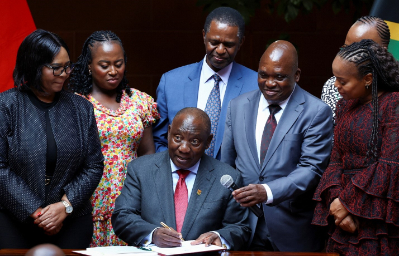A legal fiasco awaits following President Cyril Ramaphosa’s decision to approve a controversial new law that will lead to the biggest shake-up, in the health-sector’s history since the end of the racial segregation known as Apartheid thirty years ago.
It promises universal healthcare for all, but has faced fierce resistance from the main opposition Democratic Alliance (DA), which has accused the president of signing the “death warrant” of health care in South Africa. It warns that the scheme could be hugely expensive, and fuel corruption. The National Health Insurance (NHI) scheme advocates the creation of a state fund to cover the medical costs of all South Africans – most of whom are not currently covered. It goes further to bar people from taking out private health insurance for treatment paid for by the fund, which is proving very controversial. “Once the NHI fund covers a benefit, the medical schemes will not cover the same benefits,” the government says.(BBC)
The NHI poses risks of its own that has the DA concerned about the present management and condition in the healthcare system. The governing African National Congress has proved itself negligent of handling corruption with in its ranks. The antics of Eskom and the load shedding saga remains fresh in the minds of the people. This NHI Bill sounds to be even worse than if the president signed a law that nationalised the management of mines. It could even be worse given the fact that deals with wielding the power of life and death by the health department. Given how the country needs to hold the government being accountable and transparent, who will be held responsible for the loss of a patient’s life?
The DA says it will institute legal action in a bid to stop the scheme being implemented. It says it stands for universal health care, but the NHI will “destroy South Africa’s private health-care system”. “Just this week, nine healthcare associations, representing 25,000 health-care professionals, pronounced NHI unworkable,” Mr Steenhuisen wrote in an article published on News24 website. The Daily Maverick reported that the government was likely to face an “avalanche” of litigation, including from the south African Medical Association. One of the main arguments against the legislation is that it will curtail the right of people to take out private health insurance to cover their medical bills.(BBC)
The DA is right to be weary of the NHI Bill. It cuts out the private sector and therefore health insurance from having a part in the medical care system. To enforce the law with out provisions for independent oversight will create a bulwark for corruption. The government will have to raise money to cover the cancellation of various health-care contracts. This will be an expensive process. The government has yet to allow any officials to be prosecuted for state capture. The NHI Bill gives a lot of control to a government that can’t entrust the people to elect representatives directly. The NHI bill gives the state to much power where it is not needed.
The National Health Insurance (NHI) Act takes aim at a two-tier health system, in which a publicly funded sector that serves 84% of the population is overburdened and rundown while some people have access to better treatment through private insurance. Opponents have vowed to challenge it in court and described it as a ploy for votes – which the presidency denies – ahead of an election in which the governing African National Congress (ANC) is fighting to retain its parliamentary majority after 20 years in power. The legislation will gradually limit the role of private insurance, create a new public fund to provide free access for South African citizens, and set the fees and prices that private doctors and healthcare suppliers can charge for NHI-funded benefits. (Reuters)
The NHI creates an uneven distribution health care in the government bureaucracy. The government will have to increase the number of jobs in the civil service to accommodate the new healthcare system. This leads to a bloated bureaucracy managing the health care of the overall general population. This could lead to a lot of red tape and paperwork taking precedence over the health care of the patient. Money could be squandered in the system with out independent oversight. The government should have cleaned up its act before it put forward the NHI law. However, with elections approaching this is almost too late. The law will be challenged in the Constitutional Court and it could be struck down for contradicting the constitution itself.
The government should have concentrated on something more sustainable through consulting with experts in the medical field.
Article written by:
Yacoob Cassim
Journalist at Radio Al Ansaar






